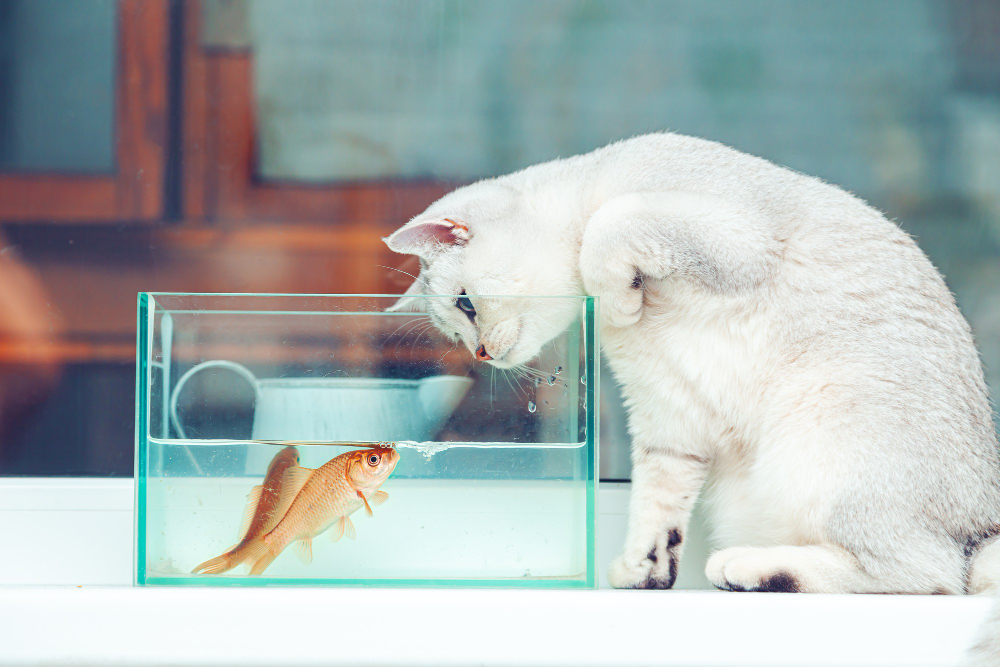For centuries, cats and fish were seen as a perfect match, as compatible as mice and cheese. Cats lapping up milk next to a generous serving of fish became an iconic image. But have you ever wondered why cats love fish so much? Or because cats like fish more than chicken? In this article, we seek to answer these intriguing questions, delving into the idiosyncratic tastes of our feline friends.
Can Cats Smell Fish?
Cats have a keen sense of smell, far superior to that of humans. It is a fundamental tool for their survival, helping them to identify food and possible threats. Their specialized anatomy plays a key role in this impressive sensory ability.
A cat’s nose is highly sensitive and houses a large number of olfactory cells, known as olfactory receptors. These cells are present in the olfactory epithelium, located inside the nose. With about 200 million olfactory receptor cells, cats have a much more accurate olfactory ability than humans. Cats’ nasal ducts are relatively long, allowing scent molecules more time to interact with olfactory receptor cells. This increases cats’ sense of smell, allowing them to detect and distinguish a wide variety of odors.
They can easily detect the smell of fish, even from a distance, and find it particularly appealing due to the strong, distinct aroma. This acute olfactory sensitivity fuels their curiosity and draws them in for a potentially tasty meal.
Why Are Cats So Attracted to Fish?
Cats are obligate carnivores. Fish is a rich source of protein and omega-3 fatty acids, components that have a characteristic odor that cats associate with a potential food source, making the meal satisfying. So, do cats like fish more than chicken? It’s hard to generalize to all felines, but the tempting fishy smell often gives it the upper hand.
While some believe that this love of fish is a result of their domestication and exposure to the human diet, others point to their genetic makeup and the search for specific amino acids and omega-3 sources, mainly EPA and DHA. However, it is critical for cat owners to remember that a balanced diet should contain a variety of proteins and should be formulated to meet the nutritional needs of cats, so always seek advice from an animal nutritionist.
What Kind of Fish Do Cats Like?
Cats’ preferences can range from cooked fish to raw fish to canned fish, although it is recommended to cook the fish before feeding it to cats. This is to avoid possible parasites or bacteria that can harm the health of both animals and owners, such as Salmonella that causes Salmonellosis, leading to symptoms such as vomiting, diarrhea, loss of appetite, lethargy and fever. In more severe cases, Salmonella infection can lead to serious complications, especially in cats with compromised immune systems, kittens and elderly cats, in humans transmission occurs through direct contact with contaminated cat feces, contaminated food or contaminated surfaces. Answering the question: do cats like raw fish? Yes, but it’s safer for them not to consume it.
Special mention must be made of tuna, which cats absolutely adore. Tuna has a strong smell and flavor, capturing cats’ attention instantly. But why do cats love tuna so much? This explains their preference in detail.
Why do cats like fish so much but not water so much?
Cats are known for their aversion to water. However, they love the creatures that come from it. This may seem paradoxical, but in fact, their aversion to water goes back to their ancestors, who lived in arid regions where swimming was not a necessary skill. However, their love of fish has more to do with the nutritional benefits and enticing aroma that fish offers.
But how is this explained? Cats are excellent hunters that have specific skills for hunting prey on dry land. Its agile and flexible body, sharp claws and keen senses are adapted for chasing and capturing terrestrial prey such as rodents and birds.
On the other hand, hunting fish in water requires different skills. Swimming, diving and dealing with water resistance are specific needs for catching fish. Domestic cats did not naturally develop these aquatic abilities, as their ancestors evolved in terrestrial environments. This lack of familiarity with water can lead to an instinctive aversion for cats to come into contact with it. They may feel uncomfortable and unsafe in the water as they don’t have the natural skills to deal with this environment.
However, fish have a strong odor that can easily stimulate the sense of smell in cats, which in turn have taste buds that are more sensitive to specific substances, such as the amino acids present in fish. This makes them appreciate the taste of fish in a particular way. The smooth, moist texture of fish can be enjoyable for cats, further stimulating their interest in this food. Furthermore, cats’ preference for fish may be an instinctive response to the need to obtain essential nutrients for their diet.
Do Wild Cats Eat Fish?
While domestic cats have a predilection for fish, what about their wild counterparts? Do wild cats eat fish? Indeed, many do. Wild cats’ diets are largely opportunistic. Fish is consumed if it’s easily available, although they tend to prefer small mammals and birds. This article delves deeper into their eating habits.
Why Do Cats Like Fish and Milk?
Cats’ affinity for fish is clear, but what about the classic image of a cat drinking milk? Why do cats like fish and milk together? The reality is that cats, especially adult cats, are often lactose intolerant, and milk can upset their digestive system. The common representation is probably due to cats’ interest in foods high in fat, both fish and milk are rich in it.
Although cats seem to like milk, only offer lactose-free milk with nutritional guidance from an animal nutritionist.
Conclusion
The intricate relationship between cats and fish is indeed fascinating. As we’ve unpacked the allure of fish for cats, we’ve found it to be a blend of sensory, historical, and nutritional factors.
Contrasting questions, such as why do cats like fish but not water, demonstrate the unique aspects of feline nature. The dietary preferences of cats, both domestic and wild, have shown to be as diverse as their personalities, adding another layer to our understanding of these enigmatic creatures.
In closing, as we aim to cater to our feline friends’ liking, it’s crucial to maintain their overall health with informed dietary choices. This understanding not only allows us to provide them with nutritious meals but also deepens the bond shared with our purring companions.

